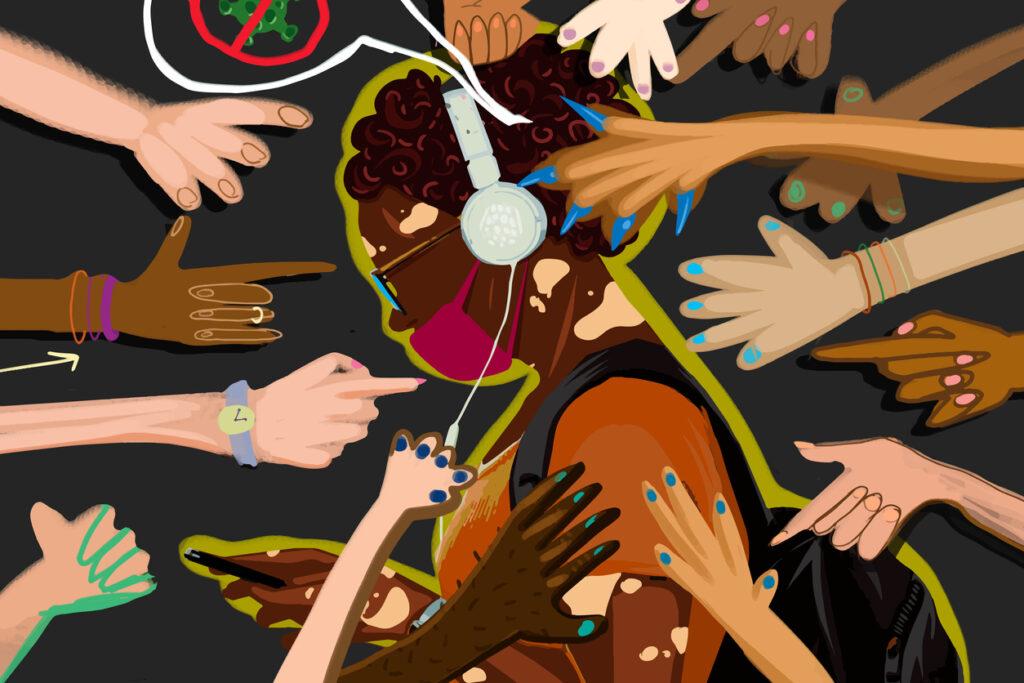This year’s UK Black History Month theme is #TimeForChange; Action Not Words. It focuses on the actions we can all take to tackle institutional racism and support Black people in the UK, taking into account how the past can inform actions that tackle institutional racism.
Black History Month means different things to different people. To me, it is a celebration of strength, creativity, vibrance and tenacity. It’s a reminder to keep going, to speak up, and that truth is subjective – anything could be a fact, but the truth means different things to each of us. And that’s our truth. It’s a reminder to be brave, to be compassionate and to be original.”
Poor mental health differs from mental ill health because of the length of time, diagnosis, treatment and recovery
At first, I found it difficult to fully engage because I was made to feel that Black History Month is a time to spotlight how marginalised we are as a race. The constant exposure to content that triggered trauma surrounding slavery, colonialism and racism made it a challenging month personally.
This narrative didn’t change for me until I started to focus on celebrating the resilience, doggedness, and creativity of those who are breaking the glass ceiling and turning back to shine a light for others to follow through.
How can HR be part of the change from a wellbeing perspective?
Black people, especially those in the diaspora are often exposed to racial trauma in one way or the other, whether as a by-product of colonialism or slavery. This makes us vulnerable to developing poor mental health and illness.
(Poor mental health differs from mental ill health because of the length of time, diagnosis, treatment and recovery. Just like you may feel unwell, without necessarily being ill or, needing medical attention).
What are your Black colleagues /employees exposed to every day both within and outside of your organisation, that places them at risk of developing poor mental health?
1. Racism and discrimination including micro-aggressions
Zero tolerance should include taking a careful evaluation of your hiring procedures and employment policies by consulting with a diverse range of professionals, who represent your target audience.
Are there hidden barriers that stop your organisation from attracting and keeping people from Black and minority ethnic groups?
2. Wellbeing support
It’s impossible to be all things to everyone, but it is possible to create an equitable environment where everyones’ needs can be met.
Don’t criticise people for not smiling more, talking more or, being present at every work gathering. Black people can be introverted too
Here are some tips to help HR be more aware this Black History Month
Pronounce my name correctly
If I am expected to pronounce, Nigel, Fiona or, Bryony correctly, then you and everyone else is expected to correctly pronounce Amaka, Kunle or Gihan. Don’t give people with ‘foreign’ names nicknames, unless they offer it.
Black doesn’t mean extrovert
Don’t expect every Black person to be the life and soul of the party. Don’t criticise people for not smiling more, talking more or, being present at every work gathering. Black people can be introverted too.
Create a culture where people can feel comfortable without masks of forced extroversion. Nurture a culture founded on respect and kindness. The workplace can be a protective factor in mental health, but it can also be a risk factor for poor mental health.
Use mentorship
This feeds into representation. For mentorship to succeed, the mentor and mentee need to meet at an intersection of shared understanding of the unique struggles they face or have faced.
How representative are your top and middle management? How diverse is it? How representative and diverse are the trainers you hire? How diverse are the keynote speakers you hire?
Benefits: Equity is not equality
We cannot have an equal workplace or community until everyone is given a fair chance to start from the same level. This would mean providing more support to some to get them to par with others. This would mean engaging with your people to understand what their needs are.
Some benefits that some of your Black colleagues or clients may need could include medical cover for family, immigration support (immigration lawyers), housing, reference letters, etcetera.
Networking
Relationships are built and maintained through networking opportunities. Creating opportunities for colleagues to get together socially across all levels, builds connections.
Cultural Awareness
Your organisation has brought a diverse range of people together from different cultural pots. It is your responsibility to educate your people on cultural awareness, by creating opportunities for learning and discovery. This will expand perspectives, reduce conflict and promote empathy.
Do more than tick a box
The observance of Black History Month is not a ‘nice to fill’ box, but one that feeds directly into the United Nations’ Global 2030 Sustainable Development Goals of Decent Work and Economic Growth and Reduced Inequalities.
Black History Month is about celebration, compassion, connection and collaboration
The business case for this is that creating a workplace environment where people feel supported, protected and seen, leads to a more engaged workforce, stronger retention and increased bottom line.
Black History Month is about celebration, compassion, connection and collaboration. It may feel perfunctory, but taking a sincere part in it, would prompt deeper reflection as our experiences shift and alter, enabling us to perform actions, and not just words.
Interested in this topic? Read 5 authentic ways workplaces can celebrate Black History Month.
[cm_form form_id=’cm_65a14c3f5da64′]






